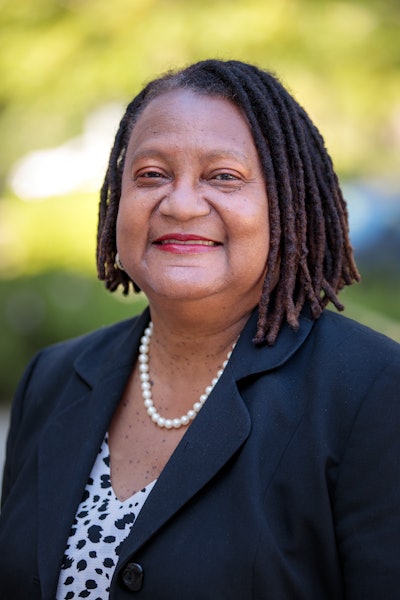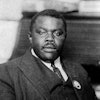In the Spring of 2020, rural Alabama was struggling to get access to COVID tests. That’s when Dr. Pamela Payne-Foster stepped in.
“We have to go there,” Payne-Foster told her boss, Dr. John Higginbotham, who is the chair of the Department of Community Medicine and Population Health and the founding director of the Institute for Rural Health Research at the University of Alabama. He has worked with Payne-Foster for over a decade.
“Pam told us, ‘You set up the testing center, I will get them there,’” he said. And the people came out in droves.
“Pam was out there directing traffic, taking people’s temperatures,” Higginbotham recalled. “She was doing whatever was needed.”
Payne-Foster, who is asthmatic, knew what she was doing was risky. But that didn’t stop her.
“I knew the people coming would be Black and Latinx, and a lot of our staff is white,” she said. “I said, ‘Look, I gotta be a face out there.’”
 Dr. Pamela Payne-Foster
Dr. Pamela Payne-FosterPayne-Foster is a public health physician and professor of community medicine and population health at UA’s College of Community Health. She’s also an expert on HIV/AIDs in rural areas, and calls herself an “activist researcher, trying to research in ways that affect policies and attitudes.”
Active in numerous activities outside the university, Payne-Foster is a member of the Tuscaloosa County Moms Demand Action, a gun control advocacy group and the Poor People’s Campaign, a moral leadership group focused on equity. She runs a community publication and radio station with her husband, William Foster Jr., called Aframsouth. Payne-Foster is also an inventor; she designed a specialized head rest for salon clients drying Black hair. In 2015, she became the research lead for UA’s College of Community Health Sciences’ Faith-based Anti-stigma Initiative Towards Healing HIV/AIDS, or Project FAITHH. Payne-Foster’s ambitions don’t end there—she hopes to one day lead a historic Black college or university (HBCU).
Payne-Foster does medical research in communities inside what is called the black belt, a region named for its rich, black soil. It’s also densely populated with African Americans, some the living descendants of Black sharecroppers.
“Pam has a passion for what she does,” said Higginbotham. “She doesn’t just say, ‘I’m here from the university to fix your problems.’ She goes in and asks, “What are your problems, and what are the things that we can work on together to help you address them?’”
Payne-Foster’s drive for community connection started at a young age. Her parents, both first generation college graduates, attended Xavier University in New Orleans, the only Catholic HBCU in the nation. Payne-Foster followed in their footsteps, and later attended Meharry Medical College in Nashville.
“Not everybody is as accepting of the authentic me as a Black academic. That’s a struggle,” she said. “But my experiences coming through HBCUs is that they’re always supportive.”
Dr. Sharlene Newman, executive director of UA’s Alabama Life Research Institute, has known Payne-Foster since 2019.
“Pam knows everybody,” Newman said. “She can go into those communities and find the leaders, the stakeholders, and just have conversations and get them to open up.”
Payne-Foster’s dedication to listening to her community helped open an avenue of discovery. When speaking to rural patients with HIV and AIDs, she asked them where they felt the most stigmatized. Church, they answered.
“It was disappointing,” she said. “But it was also an opportunity.”
That new understanding ultimately helped to create FAITHH, and Payne-Foster started reaching out to faith-based leaders. That was how she met Reverend Christopher Spencer, the community engagement officer for Black Belt Community, an organization that works in all 12 black belt counties, some of the poorest counties in the nation.
“So many researchers are in and out,” said Spencer. “She’s one that will always share the results of the data and disseminate it out to the community.”
Going out and meeting individuals is necessary for success, said Spencer.
“We don’t need researchers in their ivory towers—we need them to get on the ground, need them to get in the community, to have them train other students, develop them,” he said. “We need more Pam Payne-Fosters in the world.”
Payne-Foster knows that her work takes dedication and maintenance. “It takes a really long time for people to get to know you, trust you,” she said. “It does have to be like a marriage—worked on constantly.”
In 2019, Payne-Foster joined the second cohort of Rutgers University’s Minority-Serving Institute (MSI) Aspiring Leaders. Dr. Marybeth Gasman is the program’s creator.
“Pam really cares about making a difference in her community, in the African American community that surrounds her and the African American community at large,” said Gasman, who holds the Samuel DeWitt Proctor endowed chair in education and is a distinguished professor. “What I admire most about her is her dedication to her craft. She wants others to learn, be informed by science, and for communities to make decisions based on science,” said Gasman.
Payne-Foster hopes to one day serve as an HBCU president, to bring all her varied experiences together. The path from MD to college president is not unprecedented, but it is unique.
“I’m not trying to fit into a box,” she said, with a laugh. “I’m my own unique person.”
Liann Herder can be reached at [email protected].



















